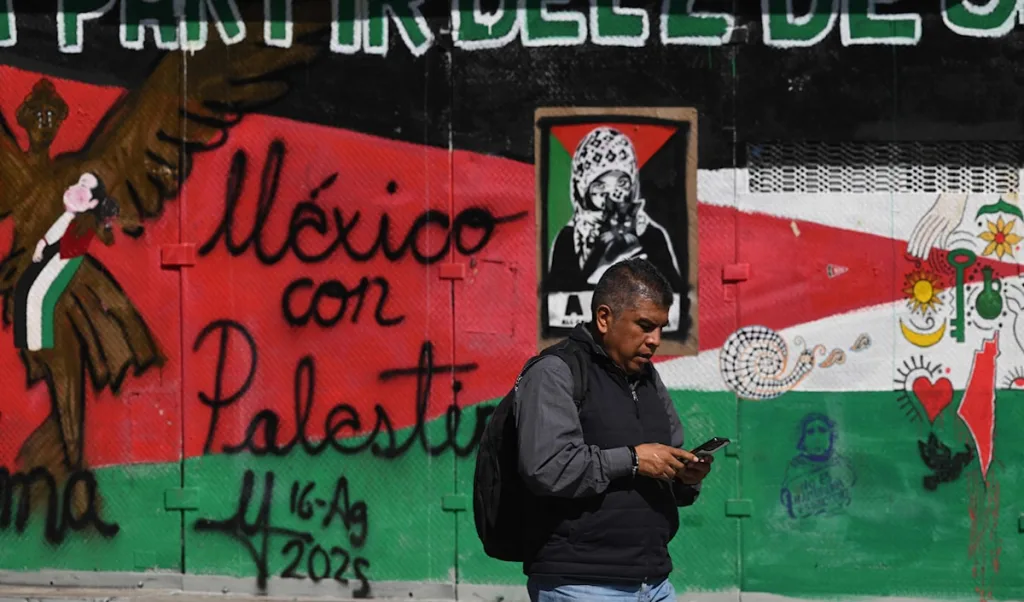
The image shows a passerby in front of a mural that reads "Mexico with Palestine." Photo: Al Akhbar/file photo.

Orinoco Tribune – News and opinion pieces about Venezuela and beyond
From Venezuela and made by Venezuelan Chavistas

The image shows a passerby in front of a mural that reads "Mexico with Palestine." Photo: Al Akhbar/file photo.
By Mohammad Khawajoui – Nov 11, 2025
Latin America has become the latest stage for amplifying what Washington and Tel Aviv call the “Iranian threat,” as both seek to expand their security narrative beyond the Middle East to the Western Hemisphere, recasting Iran as a “transnational menace.” The newest episode began last Friday, when US and Israeli media outlets circulated reports alleging that Iran’s Islamic Revolutionary Guard Corps (IRGC) plotted to assassinate Israel’s ambassador to Mexico, Einat Kranz-Nieger, a plot was allegedly foiled last summer.
According to Axios, US officials claimed that the plan was hatched by Unit 11000 of the IRGC’s Quds Force, which, in recent months, has allegedly targeted Israeli and Jewish interests in Europe and Australia. The report claimed that the operative said to be in charge supposedly spent years at Iran’s embassy in Venezuela, recruiting and directing Iranian personnel across Latin America before returning to Tehran.
The Iranian embassy in Mexico denied the report on X, on Saturday, calling it “media fabrications and a blatant lie aimed at harming the historic and friendly relations between the two great nations, Mexico and Iran.” It added that “Mexico’s security and reputation are inseparable from Iran’s. We would never betray the trust granted to us by the Mexican government.” Iran’s UN ambassador Saeid Iravani likewise dismissed the allegations as “worn-out claims not worthy of a response.”
Meanwhile, The Washington Post, citing Mexican officials, reported that authorities in Mexico had no knowledge of such a plot or its alleged foiling. Mexico’s Security and Foreign Affairs ministries also issued a joint statement saying they had “received no reports” concerning any attempted assassination. The Israeli embassy spokesperson in Mexico declined to comment on the Mexican government’s position.
US officials told AFP and Reuters that “the plot was thwarted and no longer poses a current threat,” without providing evidence or explaining how the alleged operation was disrupted. One US official told Reuters: “This is the latest episode in a long pattern of Iran’s deadly global targeting of diplomats, journalists, dissidents, and anyone who disagrees with them, something that should concern every country where thee is an Iranian presence.” Israel’s Foreign Ministry spokesperson, Oren Marmorstein, thanked Mexican security agencies for “thwarting the Iranian plot,” adding that “the Israeli intelligence and security community will continue cooperating with partners worldwide, to counter “Iran and its proxies” targeting Israeli and Jewish sites.
US intelligence agencies have long asserted that Iran operates networks capable of carrying out extraterritorial operations in Latin America, reportedly using Venezuelan territory as a logistical base. The new US and Israeli claims fit a growing propaganda pattern aimed at portraying Tehran as moving beyond West Asia to a global threat.
The Israeli entity is keen to leverage alleged “terror plots” to rally political and security support and pave the way for a larger Israeli security footprint across Latin America.
This trend reflects the post-Gaza-war landscape, in which the Israeli entity and its allies seek to expand confrontation with the Islamic Republic into nontraditional arenas. The timing of the focus on Latin America is not accidental: for Washington, the region is a renewed geopolitical battleground amid China’s rising influence and several states’ deepening technical and political ties with Iran.
The Israeli entity, for its part, appears keen to leverage alleged “terror plots” to rally political and security support from regional governments and pave the way for a larger Israeli security footprint across Latin America. Thus, the “assassination plot in Mexico” serves wider efforts to reinvigorate an anti-Iran alliance in the Western Hemisphere.
Over the past two decades, Iran has expanded economic and technological cooperation with countries such as Venezuela, Bolivia, and Nicaragua. However, these new security accusations could provide a pretext to undermine these ties, impacting banking, transport, and energy collaboration. The implicit US message is clear: warn regional governments about the “costs of dealing with Tehran” and cultivate a climate of fear and hesitation that slows the emergence of pro-Eastern or Iran-aligned blocs.
These claims are part of the ongoing “war of narratives” against Iran, which now spans media and politics across continents. Such stories are often crafted not to prove that an event actually occurred, but to entrench an image of the Islamic Republic in global public opinion as unpredictable and dangerous. The persistence of this narrative, especially in Latin America, suggests that the West has carved out a new front in the global perception battlefield, one where the “Iranian threat” has been exported beyond the Middle East to become a tool of geopolitical pressure worldwide.
Support Groundbreaking Anti-Imperialist Journalism: Stand with Orinoco Tribune!
For 7 years, we’ve delivered unwavering truth from the Global South frontline – no corporate filters, no hidden agenda.
Last year’s impact:
• More than 200K active users demanding bold perspectives
• 216 original pieces published in 2025 alone
Fuel our truth-telling: Every contribution strengthens independent media that actually challenges imperialism.
Be the difference: DONATE now to keep radical journalism alive!